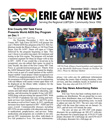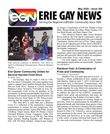In Times of Crisis and Every Day: Supporting LGBTQ Community Centers
Movement Advancement Project (MAP) is grateful to have partnered with CenterLink since 2008 to publish a biennial report of LGBTQ community centers around the country. The 2022 report was finalized prior to the mass shooting at an LGBTQ club in Colorado Springs. This tragedy underscores the importance of LGBTQ community centers and for advocacy to ensure that every LGBTQ person can live free from violence, harassment, and discrimination.
Our heart goes out to everyone impacted by the attack, and we remain steadfast in our work to support LGBTQ community centers and advocates around the country. The dangerous anti-LGBTQ legislation and rhetoric that has increased in recent years pose real risks to our communities.
For more on how to support LGBTQ people in Colorado specifically, please follow One Colorado and Inside Out Youth Services, the LGBTQ community center in Colorado Springs. Inside Out Youth Services is one of the phenomenal community centers that participated in the 2022 report, and we stand in support of the work that they and community centers do every day to support LGBTQ people nationwide.
LGBTQ community centers provide vital support in every corner of the country, especially during a time of increasing political hostility and attacks on LGBTQ people.
The 2022 LGBTQ Community Center Report, published jointly by the MAP and CenterLink, spotlights the ways that LGBTQ community centers have provided vital programs, services, and advocacy during the COVID-19 pandemic and amid rising threats to safety and security.
The 2022 report outlines how LGBTQ centers serve as anchors for local communities and how they play a key role in the broader LGBTQ movement. This biennial report looks at the services, programs, infrastructure, and capacity of LGBTQ community centers, who they serve, and the challenges they face. The findings in this year's report draw from a survey of 208 centers located in 45 states, the District of Columbia, and Puerto Rico - the largest cohort of surveys to participate to date.
Serving the Diversity of LGBTQ Communities
In 2021, LGBTQ?community centers collectively served nearly 52,000 people every week-or over 2.7 million people per year. These centers also referred more than 6,000 people each weekweekly to local business, agencies, and care providers.
The majority of centers primarily serve communities that are historically under-resourced and under-served. For example, over half of centers reported that most of the people they serve are low-income, young people under the age of 30, or people of color. Additionally, 36% of responding centers say the majority of people they serve are transgender people, and 16% of centers primarily serve people who live in rural areas.
Facing Threats to Safety in a Hostile Political Climate
Anti-LGBTQ violence and legislative attacks are again on the rise, as the horrible news from Colorado Springs shows. When political leaders consider legislation targeting LGBTQ people and promote anti-LGBTQ narratives, they contribute a dangerous political climate that can have horrific real-world consequences.
Consider the concerning rise in anti-LGBTQ legislation in the last few years alone. A previous MAP analysis found that 80% of youth live in states that considered curriculum censorship and hostile school climate bills in 2020 and 2021 alone. That includes "Don't Say Gay or Trans" and other school censorship bills, bans on transgender youth in sports, and bans on best practice medical care for transgender young people (which more than half of states considered in just the previous two years.)
Meanwhile, more than 7 in 10 LGBTQ centers reported they had experienced anti-LGBTQ threats or harassment over the past two years. Numerous centers mentioned that the threats and harassment had specifically targeted their youth-focused programs or the staff involved with those programs. These kinds of threats reflect the current political environment of targeted attacks on transgender youth in particular and LGBTQ people overall.
Providing a Range of Services
LGBTQ community centers offer programs and services ranging from health care and providing basic needs like food and shelter, to programs focused on community building and connection, arts and culture, education, and important legal services.
Supportive and inclusive health care is critical for LGBTQ people, and community centers play an important role in offering this care. More than half (53%) of LGBTQ centers offer mental health services. More than a quarter of centers (28%) provide physical health care services, including STI testing or treatment, gender affirming hormone therapy, and more. Nearly all centers provide referrals to LGBTQ-friendly health providers.
Centers are also active civic participants and contribute to local communities, including through policy advocacy, LGBTQ-inclusive trainings, and public education. More than 9 out of 10 centers engage in advocacy and civic engagement at the local and state levels.
As LGBTQ people again face an increasingly hostile climate (which is especially true for transgender people) it's clear that LGBTQ centers play a vital role in their communities. Given this critical role, it is imperative that institutional funders, government agencies, the LGBTQ movement, and individual donors prioritize the support and assistance needed for LGBTQ community centers to grow and sustain their work, which is needed now more than ever.
To schedule an interview with a MAP researcher or for questions please contact Rebecca Farmer at rebecca@mapresearch.org.
About MAP: MAP's mission is to provide independent and rigorous research, insight and communications that help speed equality and opportunity for all. MAP works to ensure that all people have a fair chance to pursue health and happiness, earn a living, take care of the ones they love, be safe in their communities, and participate in civic life. www.mapresearch.org








